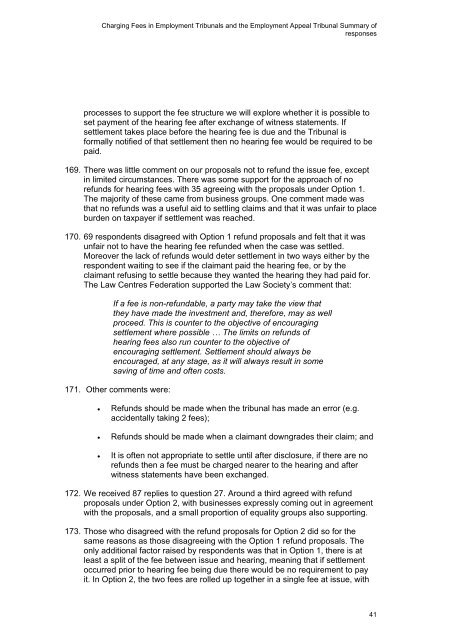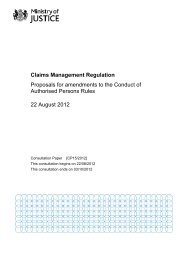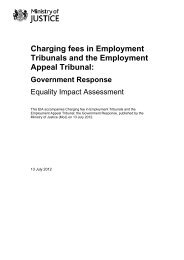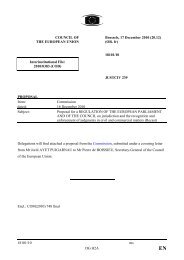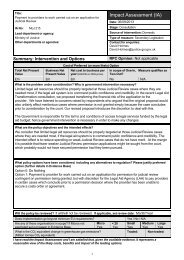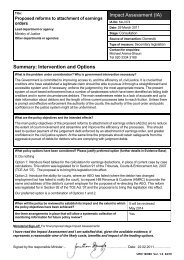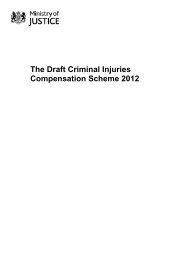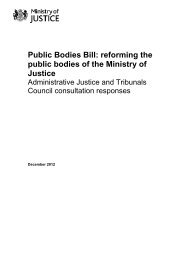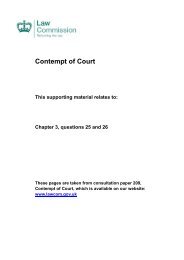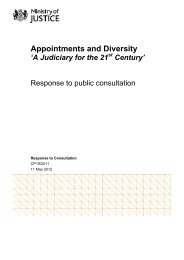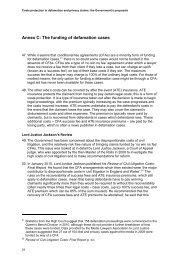Charging Fees in Employment Tribunals and the ... - Ministry of Justice
Charging Fees in Employment Tribunals and the ... - Ministry of Justice
Charging Fees in Employment Tribunals and the ... - Ministry of Justice
You also want an ePaper? Increase the reach of your titles
YUMPU automatically turns print PDFs into web optimized ePapers that Google loves.
<strong>Charg<strong>in</strong>g</strong> <strong>Fees</strong> <strong>in</strong> <strong>Employment</strong> <strong>Tribunals</strong> <strong>and</strong> <strong>the</strong> <strong>Employment</strong> Appeal Tribunal Summary <strong>of</strong>responsesprocesses to support <strong>the</strong> fee structure we will explore whe<strong>the</strong>r it is possible toset payment <strong>of</strong> <strong>the</strong> hear<strong>in</strong>g fee after exchange <strong>of</strong> witness statements. Ifsettlement takes place before <strong>the</strong> hear<strong>in</strong>g fee is due <strong>and</strong> <strong>the</strong> Tribunal isformally notified <strong>of</strong> that settlement <strong>the</strong>n no hear<strong>in</strong>g fee would be required to bepaid.169. There was little comment on our proposals not to refund <strong>the</strong> issue fee, except<strong>in</strong> limited circumstances. There was some support for <strong>the</strong> approach <strong>of</strong> norefunds for hear<strong>in</strong>g fees with 35 agree<strong>in</strong>g with <strong>the</strong> proposals under Option 1.The majority <strong>of</strong> <strong>the</strong>se came from bus<strong>in</strong>ess groups. One comment made wasthat no refunds was a useful aid to settl<strong>in</strong>g claims <strong>and</strong> that it was unfair to placeburden on taxpayer if settlement was reached.170. 69 respondents disagreed with Option 1 refund proposals <strong>and</strong> felt that it wasunfair not to have <strong>the</strong> hear<strong>in</strong>g fee refunded when <strong>the</strong> case was settled.Moreover <strong>the</strong> lack <strong>of</strong> refunds would deter settlement <strong>in</strong> two ways ei<strong>the</strong>r by <strong>the</strong>respondent wait<strong>in</strong>g to see if <strong>the</strong> claimant paid <strong>the</strong> hear<strong>in</strong>g fee, or by <strong>the</strong>claimant refus<strong>in</strong>g to settle because <strong>the</strong>y wanted <strong>the</strong> hear<strong>in</strong>g <strong>the</strong>y had paid for.The Law Centres Federation supported <strong>the</strong> Law Society’s comment that:If a fee is non-refundable, a party may take <strong>the</strong> view that<strong>the</strong>y have made <strong>the</strong> <strong>in</strong>vestment <strong>and</strong>, <strong>the</strong>refore, may as wellproceed. This is counter to <strong>the</strong> objective <strong>of</strong> encourag<strong>in</strong>gsettlement where possible … The limits on refunds <strong>of</strong>hear<strong>in</strong>g fees also run counter to <strong>the</strong> objective <strong>of</strong>encourag<strong>in</strong>g settlement. Settlement should always beencouraged, at any stage, as it will always result <strong>in</strong> somesav<strong>in</strong>g <strong>of</strong> time <strong>and</strong> <strong>of</strong>ten costs.171. O<strong>the</strong>r comments were:Refunds should be made when <strong>the</strong> tribunal has made an error (e.g.accidentally tak<strong>in</strong>g 2 fees);Refunds should be made when a claimant downgrades <strong>the</strong>ir claim; <strong>and</strong>It is <strong>of</strong>ten not appropriate to settle until after disclosure, if <strong>the</strong>re are norefunds <strong>the</strong>n a fee must be charged nearer to <strong>the</strong> hear<strong>in</strong>g <strong>and</strong> afterwitness statements have been exchanged.172. We received 87 replies to question 27. Around a third agreed with refundproposals under Option 2, with bus<strong>in</strong>esses expressly com<strong>in</strong>g out <strong>in</strong> agreementwith <strong>the</strong> proposals, <strong>and</strong> a small proportion <strong>of</strong> equality groups also support<strong>in</strong>g.173. Those who disagreed with <strong>the</strong> refund proposals for Option 2 did so for <strong>the</strong>same reasons as those disagree<strong>in</strong>g with <strong>the</strong> Option 1 refund proposals. Theonly additional factor raised by respondents was that <strong>in</strong> Option 1, <strong>the</strong>re is atleast a split <strong>of</strong> <strong>the</strong> fee between issue <strong>and</strong> hear<strong>in</strong>g, mean<strong>in</strong>g that if settlementoccurred prior to hear<strong>in</strong>g fee be<strong>in</strong>g due <strong>the</strong>re would be no requirement to payit. In Option 2, <strong>the</strong> two fees are rolled up toge<strong>the</strong>r <strong>in</strong> a s<strong>in</strong>gle fee at issue, with41


